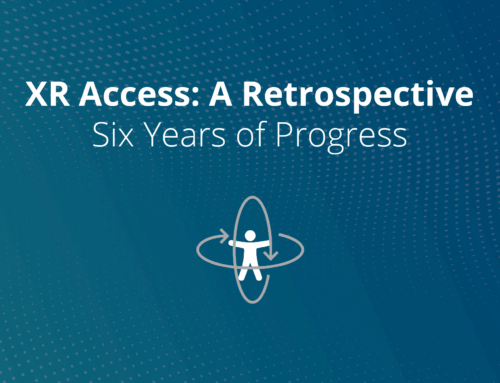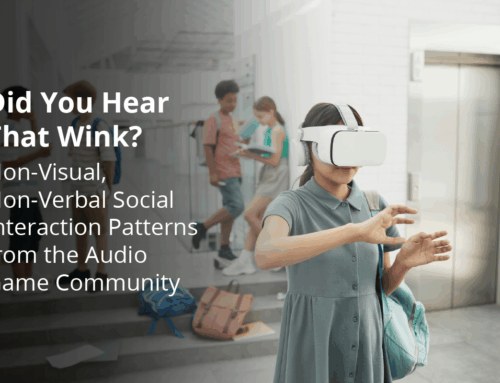XR Access will be cosponsoring a workshop on Inclusion, Diversity, Equity, Accessibility, Transparency and Ethics in XR (IDEATExR) in conjunction with the IEEE VR 2024 conference at Orlando, Florida USA, from March 16-21, 2024.
Keynote Speaker: Dr. Guo Freeman, Dean’s Associate Professor in Human-Centered Computing at Clemson University, will be presenting her talk “Designing Inclusive and Safe Social VR Systems to Protect Marginalized Communities.”
Keynote Speaker: Dr. Guo Freeman
 We are pleased to announce that Dr. Guo Freeman of Clemson University will be our keynote speaker at the IDEATExR workshop for IEEEVR ’24 in Orlando Florida. Her talk, Designing Inclusive and Safe Social VR Systems to Protect Marginalized Communities, will be given at 13:30 on Saturday March 16th, 2024.
We are pleased to announce that Dr. Guo Freeman of Clemson University will be our keynote speaker at the IDEATExR workshop for IEEEVR ’24 in Orlando Florida. Her talk, Designing Inclusive and Safe Social VR Systems to Protect Marginalized Communities, will be given at 13:30 on Saturday March 16th, 2024.
Abstract
In recent years, the growing popularity of commercial social VR platforms such as VR Chat, RecRoom, and Meta Horizon Worlds is dramatically transforming how people meet, interact, play, and collaborate online. These platforms have drawn aspects from traditional multiplayer online games and 3D virtual worlds where users engage in various immersive experiences, interactive activities, and choices through avatar based online representations. However, social VR also demonstrates specific nuances, including full/partial body tracked avatars, synchronous voice conversations, and simulated touching and grabbing features. These novel characteristics have led to varied issues regarding inclusion and safety, including greater instances of online harassment and new power dynamics compared to traditional 3D virtual worlds/online gaming or single-user VR. In this talk, Dr. Guo Freeman will introduce her recent research on novel opportunities and emerging risks in social VR. She will explain her ongoing work on leveraging innovative technologies, such as AI-based moderation and consent mechanisms, for proactively mitigating said risks in social VR. She will also highlight potential future directions for designing safer, inclusive, and more supportive social VR systems to especially protect marginalized communities such as women, ethnic minorities, and LGBTQ individuals.
About Guo Freeman
Dr. Guo Freeman is a Dean’s Associate Professor in Human-Centered Computing at Clemson University. At Clemson, she directs the Gaming and Mediated Experience Lab (CUGAME). Her work focuses on how interactive technologies such as multiplayer online games, esports, live streaming, and social VR shape interpersonal relationships and group behavior; and how to design safe, inclusive, and supportive social VR spaces to combat emergent harassment risks. Her research is also uniquely driven by her focus on marginalized technology users due to their gender, race, sexuality, age, and disability, including women, LGBTQ individuals, ethnic minorities, minors, and persons with disabilities. She has authored over 100 peer-reviewed publications and won 13 Best Paper/Honorable Mentions Awards (top 3%-5%) at ACM SIGCHI venues. She has secured $20.4 million in external grant funding from the National Science Foundation (NSF), US Army, and the Air Force Office of Scientific Research. She especially dedicates to broadening women’s and minorities’ participation in computing and was a Grace Hopper Women in Computing Faculty Mentor. She is also a highly dedicated member of the ACM SIGCHI community and has taken numerous leading editorial and organizational roles in SIGCHI throughout her career, including: ACM CHI PLAY 2024 General Chair; ACM GROUP 2025 General Chair; ACM CHI PLAY Steering Committee member; ACM CHI PLAY Papers Chair in 2022 and 2023; and ACM IMX 2021 Technical Program/Papers Chair.
Workshop Schedule
| Time | Event |
|---|---|
| 8:30 – 8:40 | Welcome & Opening Remarks |
| 8:40 – 9:40 | PAPER SESSION I: ACCESSIBILITY
|
| 9:40 – 10:00 | A Guide on XR Access – Dylan Fox (XR Access) |
| 10:00 – 10:30 | Coffee Break |
| 10:30 – 11:00 | LIGHTNING TALKS
|
| 11:00 – 12:00 | Discussion Session I: Accessibility in Mixed Reality |
| 12:00 – 13:30 | Lunch |
| 13:30 – 14:30 | Keynote Speaker – Dr. Guo Freeman (Clemson University) Designing Inclusive and Safe Social VR Systems to Protect Marginalized Communities |
| 14:30 – 15:30 | PAPER SESSION II: DIVERSITY, EQUITY, INCLUSION, AND ETHICS
|
| 15:30 – 16:00 | Coffee Break |
| 16:00 – 16:20 | Creating a Diverse and Supportive Lab – Dr. Aleshia Hayes (University of North Texas) |
| 16:20 – 17:20 | Discussion Session II: Diversity, Equity, and Inclusion in Mixed Reality Research |
| 17:20 – 17:30 | Closing remarks |
We are quite excited to shine a light on our key goals with IDEATExR, and hope that our lineup of talks and discussions will foster new research avenues as well as push the boundaries of mixed reality research. We can’t wait to see you in Orlando!
IDEATExR Call for Papers
Abstract
The potential benefits of XR should be for all, regardless of their cultural background, gender identity, race, neurodiversity, ethnicity, economic status, age, etc. However, our community is still facing challenges preventing equal involvement.
Most research within this space relies on the M-WEIRD user populations and is done by M-WEIRD researchers (Male, White, Educated, Industrialized, Rich, and Democratic), effectively missing most of the world’s population [1], thus hindering generalizability of findings and diversity of ideas. In fact, approximately 95% of the global population is excluded from VR research [1] and only 15% of first-paper authors at ISMAR and IEEEVR are women [2]. Moreover, the ethics informing XR research have been identified as one of the grand challenges facing human-computer interaction research today, with the replication crisis featuring transparency as a critical step for remediation.
These factors make formal discussions surrounding inclusion, diversity, equity, accessibility, transparency, and ethics in XR not only timely – but necessary. And we want you to be a part of them. It’s important to note that these concerns are also relevant to technical work not involving human participants as they also play a role in research teams, ideas, proposed solutions, conduct, etc.
Goals
- To provide a vehicle through which to understand better the pulse of the community surrounding issues of inclusion, diversity, equity, accessibility, transparency, and ethics in XR,
- To shine a spotlight on these issues for community members who perhaps haven’t seen or given them much consideration,
- To celebrate those that are engaging in research either true to the spirit of inclusion, diversity, equity, accessibility, transparency, and ethics in XR, or those engaging in research about these topics specifically,
- To help researchers better understand how to ensure their work are more inclusive, diverse, equitable, accessible, transparent, and ethical, particularly in their software and study design,
- To spotlight how people are represented in XR technologies (or not) as researchers, designers, participants, and users,
- And to bring together disparate perspectives and research foci together under a shared goal to be inclusive, diverse, equitable, accessible, transparent, and ethical in XR. This goal can be shared by software, hardware, and human-focused researchers.
Participants in this workshop will have the opportunity to provide their insights on what is working for our community, as well as what isn’t – effectively helping to shape the future of IEEEVR and XR research.
Topics of Interest
This workshop has six facets: inclusion, diversity, equity, accessibility, transparency, and ethics. We expect researchers to submit early work that has already shown a commitment to one or more of these aforementioned facets. These could include work with diverse participants, work examining skin-tone rendering in AR, computer vision algorithms for differently-abled hands, testing of accessibility and usability of a VR app for those with different sensory abilities, etc. Further, while we anticipate this next type of paper to be rarer, we anticipate papers that feature research explicitly regarding the realm of diversity in XR. Finally, position papers informed by either survey of the literature or profound experience in the facets of this workshop are also well within our scope.
Important Dates
Paper Submission Deadline: Friday January 12th, 2024 (23:59 AoE)
Notification: Monday January 22nd, 2024 (23:59 AoE)
Camera-ready version: Friday January 27th, 2023 (23:59 AoE)
Submission
Please note: The submission deadline has passed. We will no longer be accepting new submissions for IDEATExR.
—
We have two submission options (or ‘formal’ ways to engage with IDEATExR)!
- We welcome paper submissions from 2-4 pages, excluding references. Authors should also provide a brief explanation (At least one paragraph; no more than 1 page attached in supplementary materials) of how they feel their paper fits into this workshop or achieves the workshop’s facets. Paper quality versus length will be assessed according to a contribution-per-page judgment. Papers will be considered in relation to their intended scientific merit AND their contribution or adherence to inclusion, diversity, equity, accessibility, transparency, and ethics in XR.
- We welcome lightning talk proposals 1 page in length, excluding references (what your talk is about and how it fits into IDEATExR). These are 5-10 minute ‘talks’. They can be used to promote an idea, share preliminary ideas and get feedback, or propose collaborations based around the goals of IDEATExR. These will NOT be published papers (though recordings may be posted with author permission) but are instead a way for community members to contribute ideas or generate discussion without the need to write a paper.
Submissions must be written in English and follow the IEEE Computer Society VGTC format.
Submissions will be reviewed by at least 2 program committee members following a double-blind review process. Accepted papers will be given guidelines for preparing and submitting the final manuscript(s) together with the notification of acceptance.
More information and submission guidelines can be found at the workshop website. Please direct any questions to Lee Lisle at llisle@vt.edu.
Organizers
Citations
[2] T. C. Peck, L. E. Sockol, and S. M. Hancock, “Mind the Gap: The Underrepresentation of Female Participants and Authors in Virtual Reality Research,” IEEE Trans. Vis. Comput. Graph., vol. 26, no. 5, pp. 1945–1954, 2020, doi: 10.1109/TVCG.2020.2973498.




